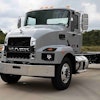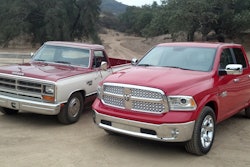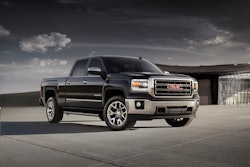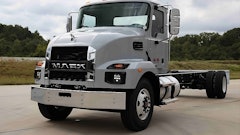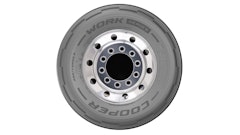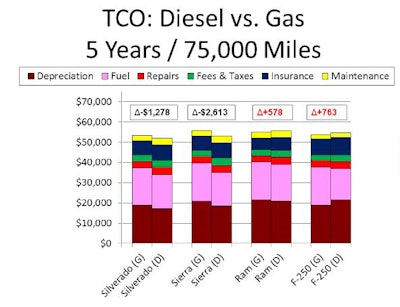
Whether a diesel three-quarter-ton pickup truck’s total ownership cost is better or worse than its gasoline-powered counterpart depends on which truck you buy. Over three years:
- Chevrolet Silverado’s diesel 2500 saves the owner an estimated $3,673 compared to the gasoline-powered version of the vehicle
- The GMC Sierra 2500 owner saves $2,720
- The Ram 2500 diesel costs only $67 less than the gasoline-powered version
- The diesel Ford F-250 costs an estimated $1,395 more than for its gasoline counterpart
A study by the University of Michigan Transportation Research Institute, commissioned by the Robert Bosch Corp., compared the total cost of ownership (TCO) for near-identical gasoline and diesel versions of the same vehicles by combining estimates of depreciation and fuel cost with costs for insurance, repairs, maintenance, and taxes and fees over a three- and five-year time periods.
Diesel’s advantage in the GM pickup trucks narrows slightly at five years, and the Ram 2500’s TCO moves from near break-even ($67) to the diesel costing $578 more than gasoline power.
The Ford F-250 diesel at five years continues to have a TCO higher than the gasoline version ($763), but the difference is less than the $1,395 three- year TCO estimate.
All the diesel vehicles get more miles per gallon than their gasoline counterparts. Fuel economy and mileage don’t change dramatically over the course of these three-quarter-ton pickups’ lives, but the diminishing difference between gas and diesel resale value over time tends to reduce diesel’s advantages.
The University of Michigan’s method to estimate the differences between diesel and gasoline costs is based on information from:
- Blackbook records of manufacturer-suggested retail pricing
- Energy Information Administration history on average annual fuel prices
- National Highway Transportation Safety Administration average annual miles travelled
- U.S. Environmental Protection Agency average miles per gallon
- 20,192 records from Mannheim used-vehicle auctions in 2010 and 2011
- Vincentric records of insurance, repairs, maintenance, fees and taxes
The study compared vehicles from different timeframes by adjusting all prices to 2011 dollars using Consumer Price Index estimates for new and used vehicles. Prices for inputs – manufacturer-suggested retail prices and auction prices, average cost of fuel in any year, insurance, repairs, maintenance, etc. – were adjusted to 2011 dollars using the Consumer Price Index.
Nine of ten diesel vehicles in the study hold their value better than comparable gas vehicles over five years, but there is a wide variance in the percentage of savings. Five of the ten vehicles show double-digit percentage savings over three years, ranging from 10 percent to 39 percent. Three diesel vehicles show single-digit saving, of three, six and nine percent savings. One gas vehicle, the Ford F-250, holds its value better than its diesel counterpart at 13 percent.
The summary of the study suggests, “The Ford F-250 diesel may be suffering from a reputational problem due to a number of years where the quality of its diesel engine was suspect. This issue would lower the resale value of the F-250 diesel and allow the gas version to better hold its value.”
Using average miles driven for passenger vehicles and EPA fuel-economy averages does skew this analysis away from construction-work-truck conditions. And average ownership of construction pickups is longer than five years.



